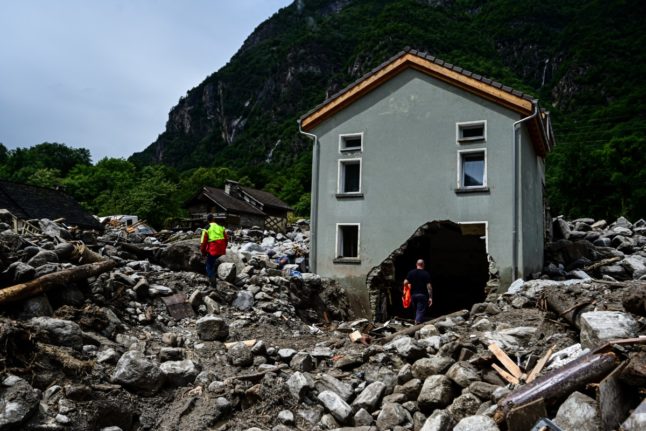It’s Valentine’s Day on February 14th. Whether you celebrate or prefer to ignore it, here are some romantic phrases in three of Switzerland’s official languages to try out on your partner or whenever you next have a crush.
Swiss German
Ich ha di soo gärn!
To people unfamiliar with Swiss German, this may not sound harsh rather than romantic.
But in fact, this phrase falls under the ‘awwww’ category; it means ‘I love you so much!’
Du bisch mine Schätzli
In the Swiss-German part, this word (or its variation, Schätzeli) literally means ‘my little treasure.’
This term of endearment is used between lovers, though parents also say it to their children — it applies to anyone you love, adore, or like A LOT.
Ich bi total i dich vernarrt!
Another expression which you can safely use in Swiss-German parts of the country. It means, simply, ‘I am totally wild about you.’
If you prefer to express your love in high German, these are the phrases to learn:
Schmetterlinge im Bauch
The feeling of excitement and anticipation when you set eyes on your crush is the same in German as it is for English-native speakers, it seems: the phrase “having butterflies in the stomach” – or Ich habe Schmetterlinge im Bauch – is widely used when speaking German too.
Ich bin verknallt in dich
Before you reach the being-in-love part of a relationship, you may find yourself being verknallt in someone – meaning to have a crush on someone.
As the noun Knall means “bang” or “crash” in German, it’s likely that the expression comes from the feeling of being hit with a crashing infatuation.
Du hast wunderschöne Augen
A stone-cold dating classic that’s sure to bring a smile to your German-speaking sweetheart’s face. Meaning “you have beautiful eyes” this phrase is a guaranteed winner. Of course, you can replace Augen (“eyes”) with any other part that you find particularly beautiful (if you so wish!)
READ ALSO: Hochdeutsch vs Swiss German – What are the key differences?
Willst du mein Freund/meine Freundin sein?
In the modern world – and especially in the dating scene of bigger cities, it might not always be clear where you stand with your lover in terms of exclusivity.
Ich bin in dich verliebt
Ah, to be in love. This is the phrase you want to save for that special someone when you know it’s really love, as it means “I am in love with you”.
Another, very straightforward way to declare your love is to say “Ich liebe dich” or even “Ich hab’ dich lieb”.
Remember… these are ‘standard’ or ‘high German’ phrases. Check out this video for some local Swiss German variations of saying I love you.
French
Mon petit chou
This may not sound romantic, since the word ‘chou‘ means ‘cabbage’ in French.
But rest assured that if someone refers to you as ‘my little cabbage’ in the French-speaking pars of Switzerland, that person really, really likes you.
Mon amour
Perhaps slightly formal, but this tells someone that you love them, it literally means ‘my love’. Also in the realm of more formal and slightly old-fashioned greetings is mon coeur – my heart or my love.
READ ALSO: What you need to know about languages in Switzerland
Le ou la faire craquer
This mean to fall for someone. Craquer means to ‘give in’ so you’ll use this idiomatic phrase when you’ve managed to seduce someone or when you have been seduced.
Elle me fait trop craquer – I’ve really fallen for her.
Voici mes conseils pour le faire craquer – Here’s my advice to snag him.
Décrocher un premier rendez-vous
Here’s a phrase which means ‘to get a first date’. It’s not always easy – but when it happens you may want to share the news.
J’ai enfin décroché un premier rendez-vous avec elle ! – I finally got a first date with her!
En pincer pour
This is the phrase you need when you really like someone. Pincer means ‘to pinch’ but this idiomatic phrase is used when you are really fond of someone.
J’en pince pour toi – I really like you.
Mon bébé
Here’s the French version of ‘baby’ or ‘babe’. Its most frequently used between lovers, and is kinda cute!

Italian
Mi piaci
Let’s start at the more casual end of the romance spectrum.
Mi piaci simply means ‘I like you’ – while it’s often non-romantic, it can definitely also mean ‘I fancy you’. Instead of ‘like’ though, Italian uses the verb ‘please’ and inverts the subject and object, so in purely grammatical terms the literal English translation of this expression is more like ‘you please me’.
READ ALSO: Swiss Italian vs standard Italian – what are the key differences?
Sono pazzo/a di te
If you are mad about someone, you can tell them exactly that. Sono pazzo/a di te – ‘I’m mad about you’ – is one phrase that directly translates between Italian and English. Just like in English, in other contexts pazzo literally means ‘crazy/mad’.
Colpo di fulmine
Literally a ‘lightning bolt/strike’, a colpo di fulmine is the Italian way to talk about love at first sight: it’s as though you were struck by lightning, and haven’t been the same since.
This phrase obviously needs to be used in combination with other words – you might say la prima volta che ti ho visto/a è stato un colpo di fulmine (‘the first time I saw you it was love at first sight’).
A less poetic alternative is amore al primo sguardo/amore a prima vista, which translates directly as ‘love at first sight’.

Sei la mia anima gemella
Buckle up, because we’re really heading into intense territory now. A soulmate in Italian is an anima gemella – literally, a ‘twin soul’.
You’ll want to make sure you’re deeply in love – or at least a couple of glasses deep into your Sangiovese – before telling your love interest sei la mia anima gemella: ‘you are my soulmate’.
READ ALSO: How did Switzerland become a country with four languages?
Mi sono innamorato/a di te
When you’re telling someone you love them, sometimes it’s best to be direct about it.
Mi sono innamorato/a di te means ‘I’ve fallen in love with you’/ ‘I’ve fallen for you’; if you want to take things even more back to basics, you can go with a simple ti amo – ‘I love you’.



 Please whitelist us to continue reading.
Please whitelist us to continue reading.
Member comments